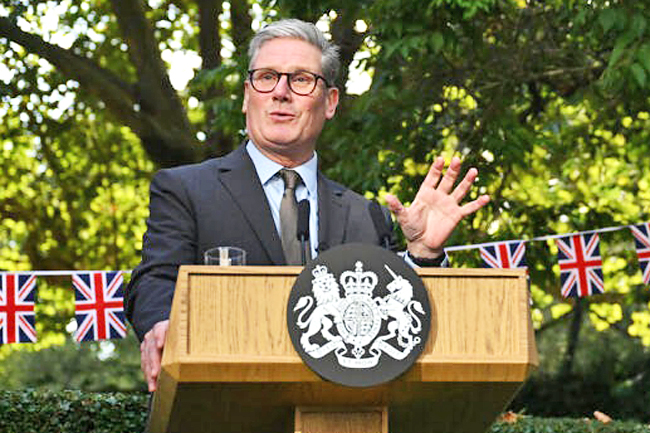AFP – United Kingdom (UK) state debt is as big as the country’s economic output for the first time since the 1960s, data showed yesterday, as the new government warns of tough fiscal decisions before its maiden budget.
Public sector net debt “was provisionally estimated at 100 per cent of gross domestic product (GDP) at the end of August”, the Office for National Statistics (ONS) said in a release.
Prime Minister Keir Starmer, whose Labour Party was elected in early July, has warned Britons that the budget announcement on October 30 will be “painful”, with tax rises and spending cuts expected.
The warning has been echoed by Finance Minister Rachel Reeves, who will deliver the country’s fiscal plans to Parliament.
The government is already facing criticism from all sides over scrapping a winter fuel-benefit scheme for 10 million pensioners.
Starmer has repeatedly defended the move as a necessary “tough choice” to help fill a GBP22-billion (USD29 billion) “black hole” in public finances which Labour claimed was left behind by the previous Conservative administration.
Yesterday’s data also showed “the highest August borrowing on record, outside the (Covid-19) pandemic”, senior official at the UK Treasury Darren Jones said in a statement.

“Debt is 100 per cent of GDP, the highest level since the 1960s. Because of the GBP22 billion black hole in our public finances we have inherited this year alone, we are now taking the tough decisions now to fix the foundations of our economy,” he added. The debt-to-GDP ratio was at 99.3 per cent in July.
Net borrowing in August reached GBP13.7 billion on increased spending on public services, the ONS noted.
This is set to continue after the government this week agreed bumper pay increases for doctors and train drivers.
Looking much further ahead, a government watchdog last week forecast that UK state debt could almost treble over the next 50 years owing to an ageing population and climate change.
The projection came from the Office for Budget Responsibility, which the government relies on for UK growth and inflation predictions.
Adding to the challenge, a closely-watched index revealed yesterday a big drop in UK consumer confidence. Data analysts GfK said its consumer confidence index “fell sharply” to minus 20 points in September.
“This is not encouraging news for the UK’s new government” despite stable British inflation and the prospect of more interest-rate cuts from the Bank of England, said GfK consumer insights director Neil Bellamy.
“Strong consumer confidence matters because it underpins economic growth and is a significant driver of shoppers’ willingness to spend.
“Following the withdrawal of the winter fuel payments, and clear warnings of further difficult decisions to come on tax, spending and welfare, consumers are nervously awaiting the budget decisions,” he added.



















































